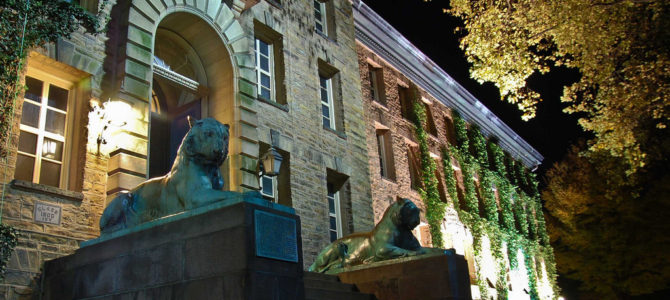
The Princeton University Whig-Cliosophic Society, the college’s premier debate society and the oldest debating union in the United States, recently disinvited conservative law professor Amy Wax one day before she was scheduled to speak. The Princeton Tory reports:
‘Is this a hoax?’ replied Amy Wax, the Robert Mundheim Professor of Law at the University of Pennsylvania, when she received an ‘URGENT’ email from Whig-Clio’s leadership announcing that the free speech event she was headlining alongside Princeton University Politics Professor Keith Whittington was not going to be held the following day.
The students cancelled the lecture because of controversial statements Wax had said, including “I’ve never seen a black person graduate at the top quarter of my class,” for which she has faced heavy criticism. In the full video, Wax made clear that she did not view her black students as “morally” inferior, only that they were on average “functionally” overmatched due to the affirmative action policies of her own elite law school at the University of Pennsylvania. This overmatching causes black students to lose their motivation for law and ruins otherwise promising careers, she argues.
Wax, a tenured professor at the University of Pennsylvania, is certainly no stranger to controversy. She has gained detractors for being a supporter of traditional values and the idea that some cultures are superior to others. Whatever one thinks of her views, they didn’t deserve to be de-platformed.
The abrupt cancellation of Wax’s speech was more than just rude. It is a betrayal of the longstanding tradition for America’s elite universities to host reasoned debate at the highest level of controversy.
A Betrayal Of Founding Principles
The Whig-Clio Society was founded in part to air the tough debates between James Madison and Aaron Burr. Today it is run by co-presidents Lena Hu and Justin Wittekind, whose fundamental ideologies are steeped in an identity politics that would embarrass Madison and his fellow Founding Fathers.
For example, regarding an upcoming debate on abortion, Hu once wrote to another board member of the Whig-Clio Society in a private message, “As a woman on this campus and also the friend of many other women on campus I legitimately HATE THE IDEA OF A BUNCH OF CONSERVATIVE MEN DEBATING THE RIGHTS TO FEMALE BODIES.”
One would think that the leader of one of the foremost debating associations in the country would be able to grasp one of the simplest principles in intellectual discourse: that the ad hominem argument, which attempts to attack the character of the debater rather than the strength of his or her contentions, is a logical fallacy.
One would also think that the editors of The Princetonian, which were made aware of the story but did not publish an article on it, would work hard to expose this clear violation of the legacy of Princeton’s vaunted spirit of debate in order to ensure that it would not happen again. Evidently, however, the student editors did not think the issue newsworthy––or didn’t want to offend their liberal friends.
To be fair, not all students at Princeton behave this way. The Princeton class of 2022’s pre-reading is a book promoting free speech. Perhaps the school administration has begun to realize how hostile campuses across the nation have become to free speech and is working to address it. If so, the administration should be applauded.
Intellectual Quality Concerns
But the administrations of all Ivy League colleges, including Princeton, have reason aplenty to be concerned about the intellectual quality of their graduates. In a world where elite students worship at the altar of identity politics, where dissent is equivalent to Satanic verse, critical thinking and open-mindedness tend to be left out in pursuit of the ultimate oppression narrative.
Social justice worship is built directly into their admissions process. It is an open secret that elite universities engage in racial balancing procedures that artificially inflate the numbers of certain racial minorities (blacks and Hispanics) while depressing the numbers of others (Asians), all in the name of manufacturing a “diverse” student body. These admissions practices invariably send the message to bright young college prospects that their racial identity is more highly valued at these schools than even their own merit.
Things don’t get any better once you enter these Ivy League halls: Yale University requires all of its graduate students to undergo implicit bias training, which might have counterproductive effects on their discourse with minorities. Harvard University forces incoming faculty to write and sign a statement about their commitment to diversity ideology, which Harvard scholar Jeffery Flier calls “an affront to academic freedom.” In elite universities such as these, spouting narrow-minded social justice ideology is like breathing.
Finally, declining academic standards have created a culture of entitlement that allows students to fly through college without having to confront the adversity that produces the courage to face your foes. Grade inflation has been documented as a major problem at almost every Ivy League college, with the top five average GPAs in colleges across America composed of four Ivy Leagues (and Stanford University).
Some of these colleges take extreme measures to ensure that their students receive sparkling GPAs. Brown removes all failing grades from their students’ GPAs. The Massachusetts Institute of Technology allows all freshmen to take classes without receiving grades, supposedly to allow them to “adjust to MIT’s teaching and grading methods.”
Full-scale immersion in identity politics, as well as an entitlement culture that poorly equips students to handle adversity, has created too many mentally weak Ivy Leaguers who cannot handle even good-faith debate, much less the hostile realities that will confront them as soon as they are ushered into their first jobs. What the Whig-Clio society did by disinviting Wax from campus is not leadership. In fact, it is worthy of America’s apprehension.
We must grapple with the new reality that America’s elite colleges cannot be blindly trusted to churn out high-quality learners and leaders.









